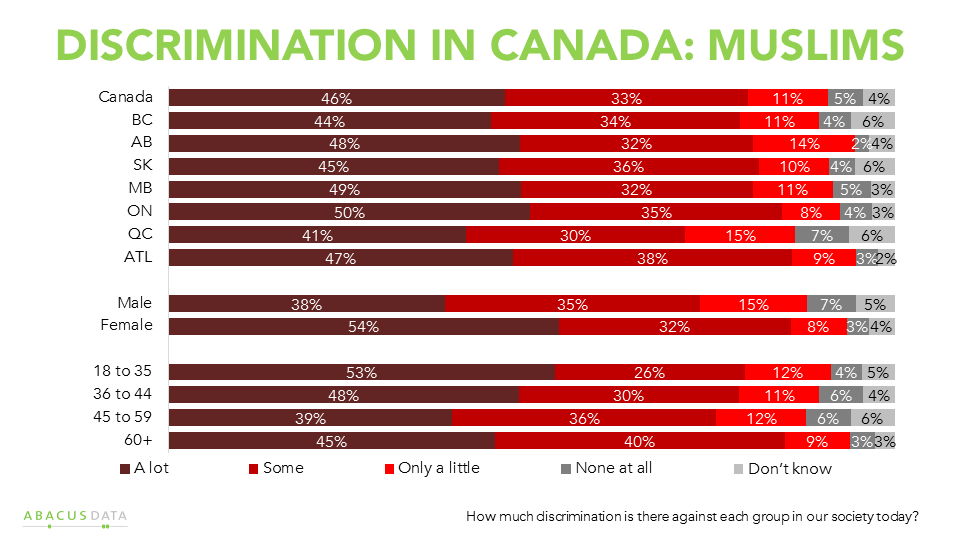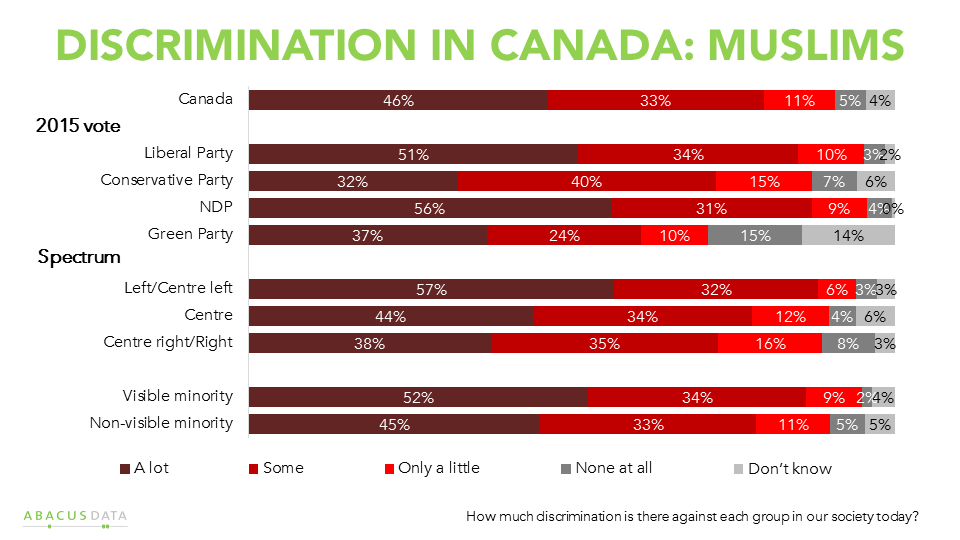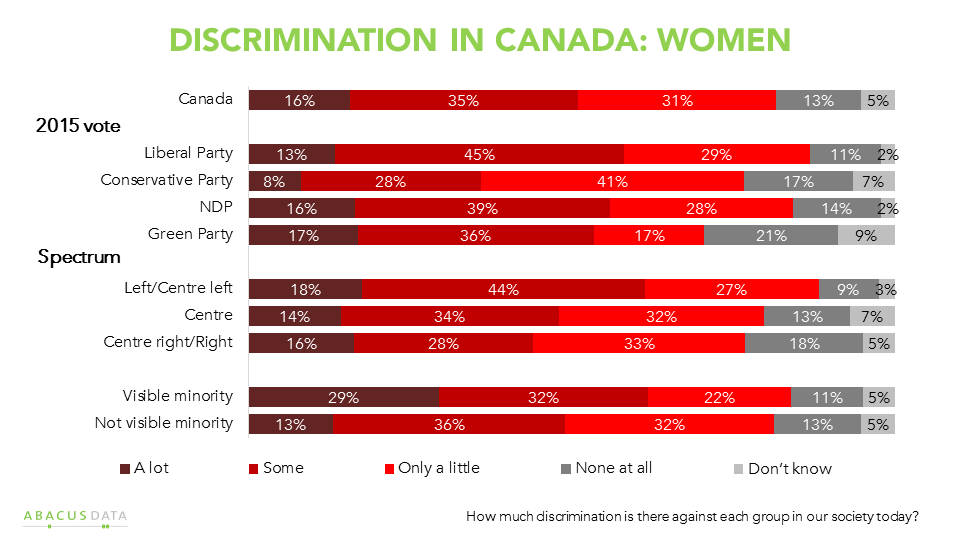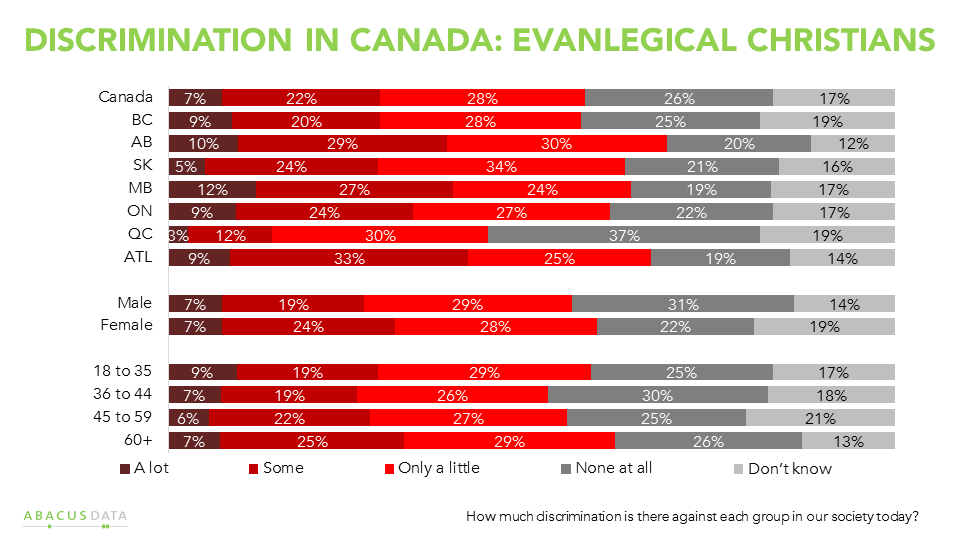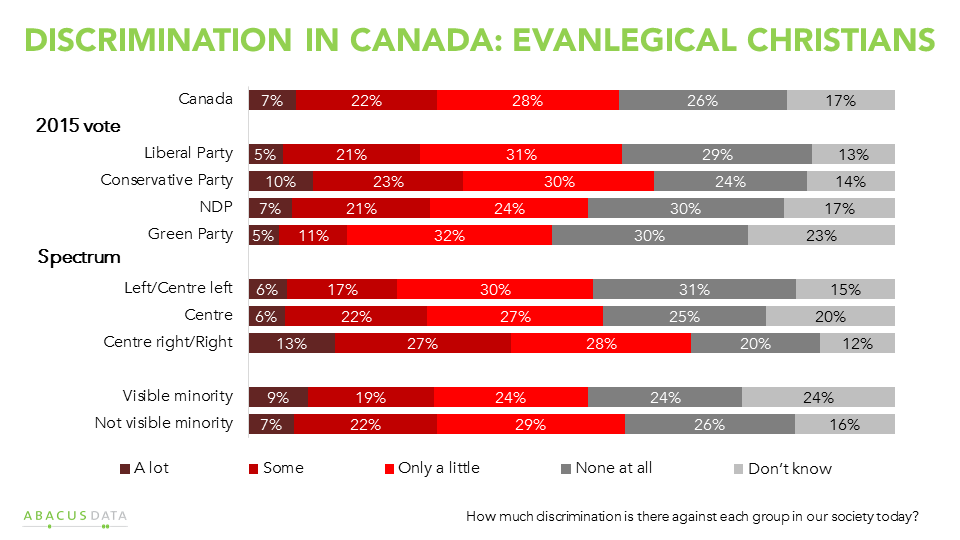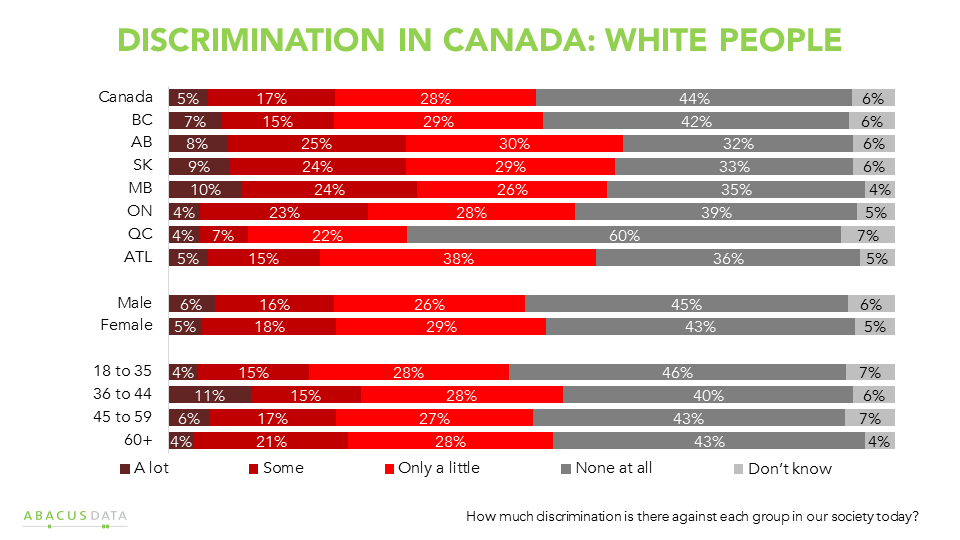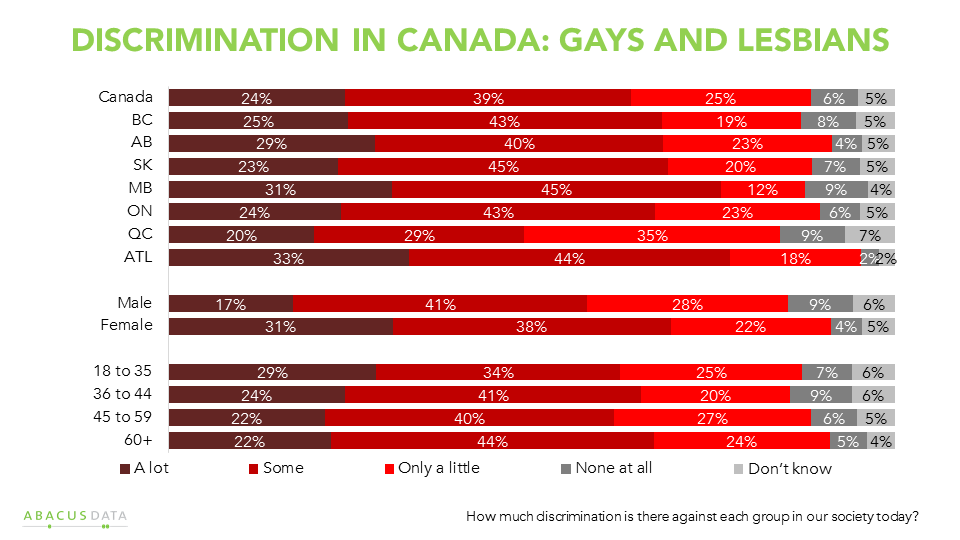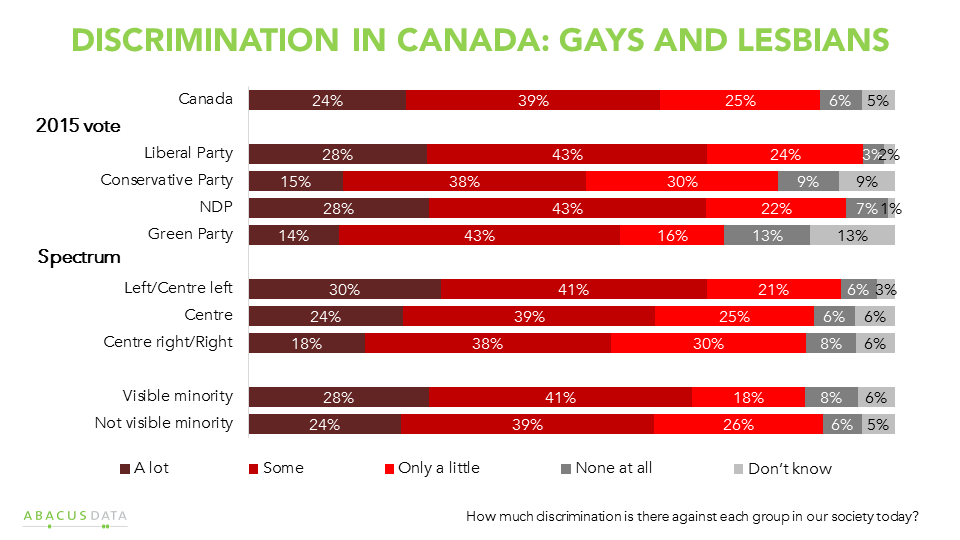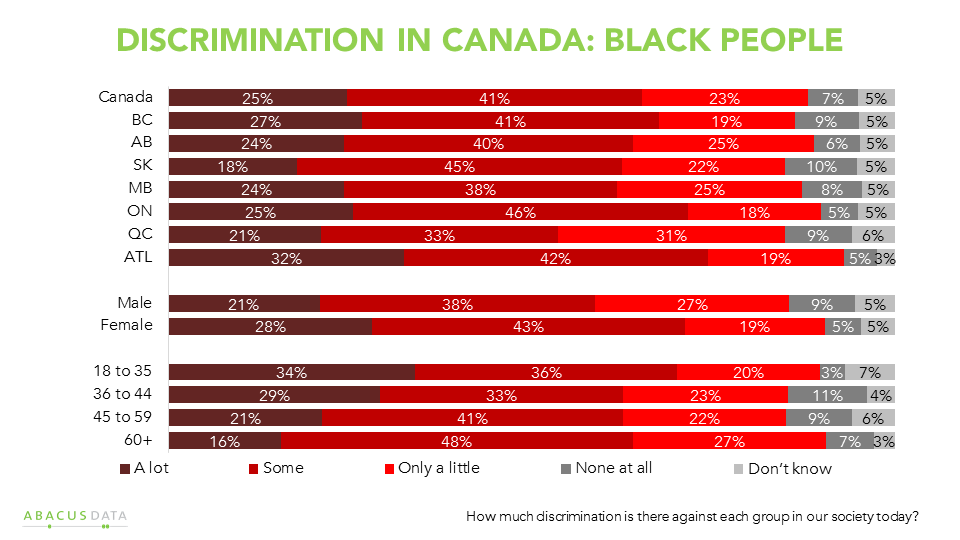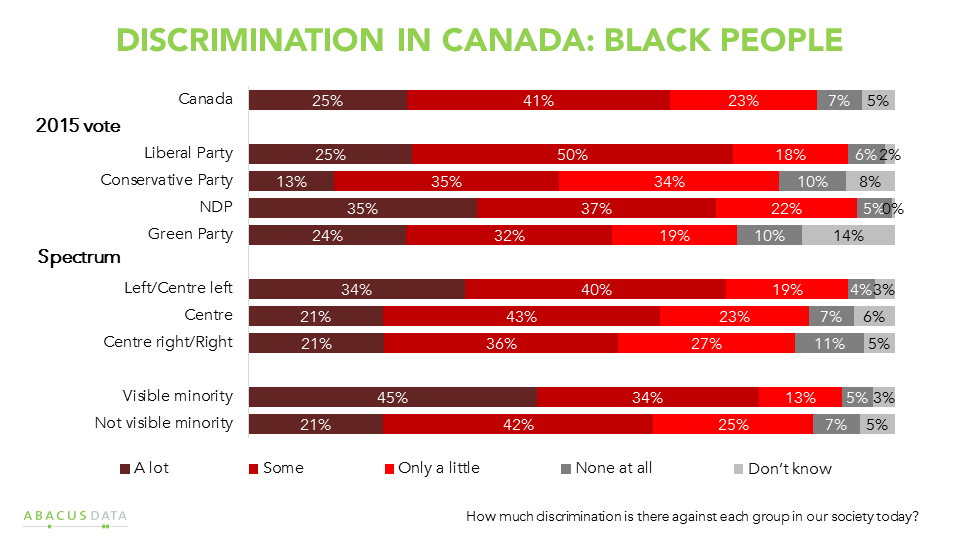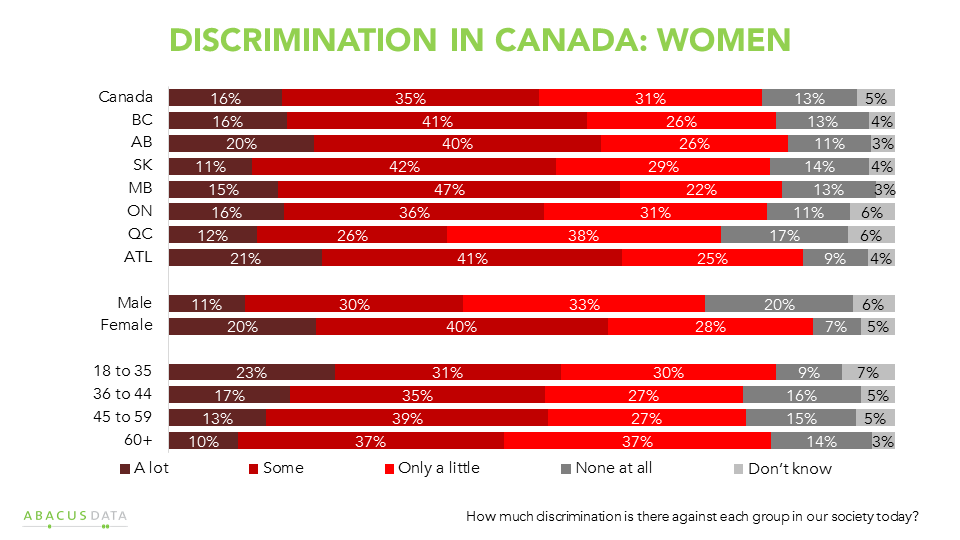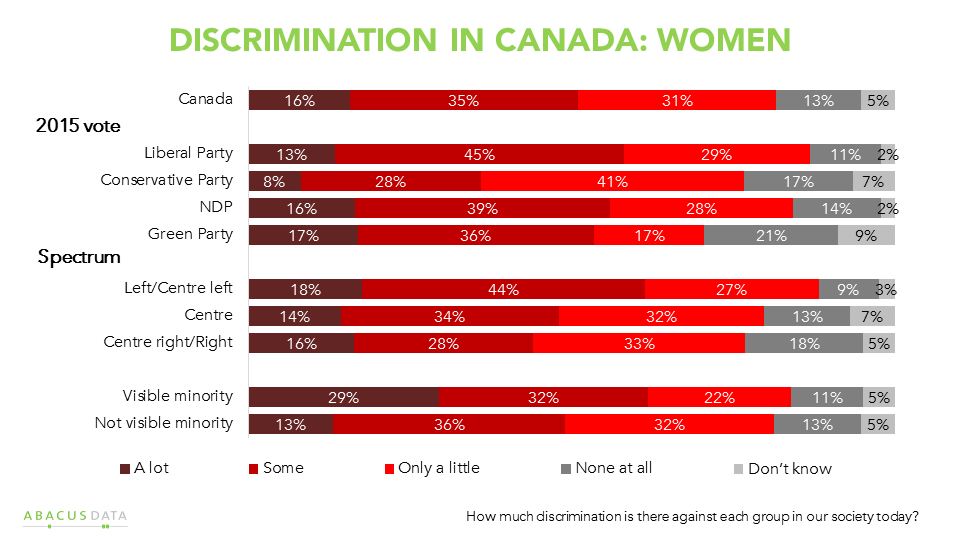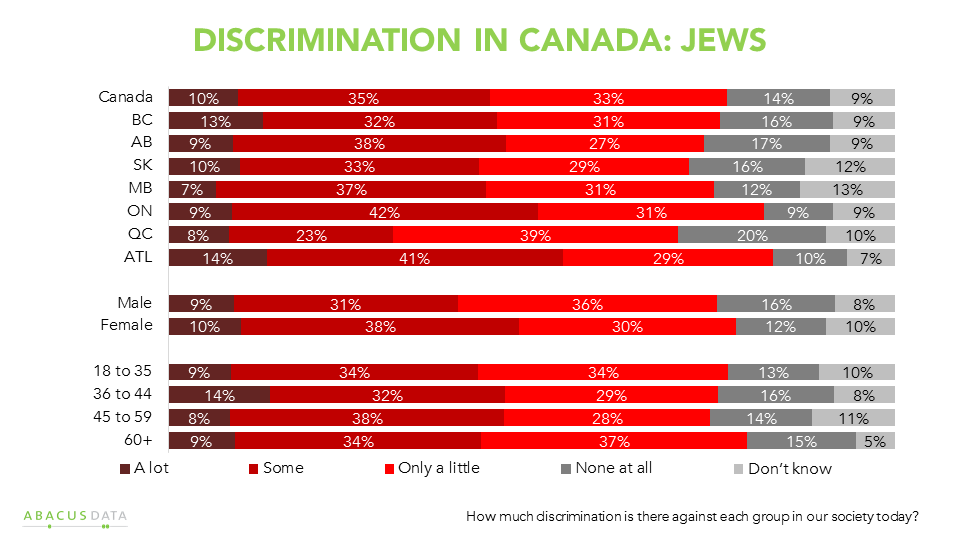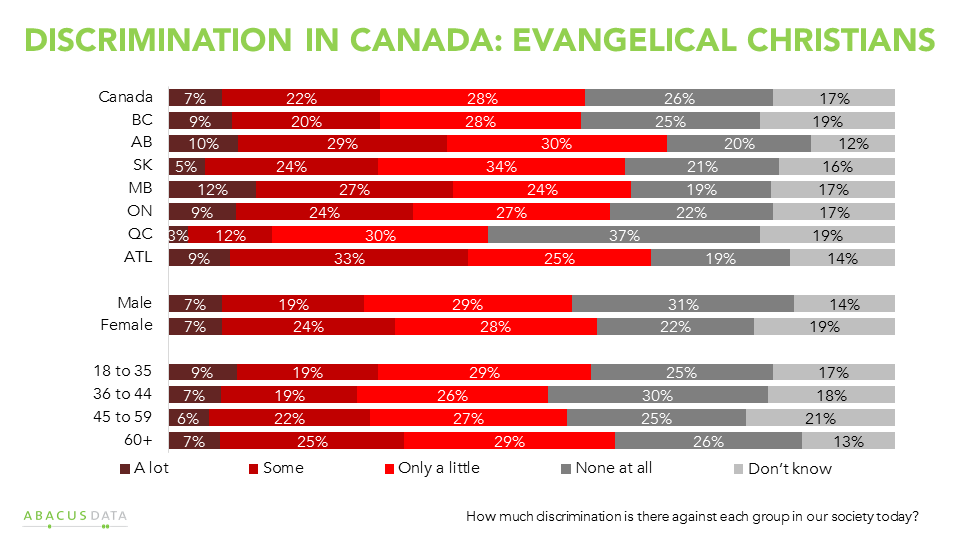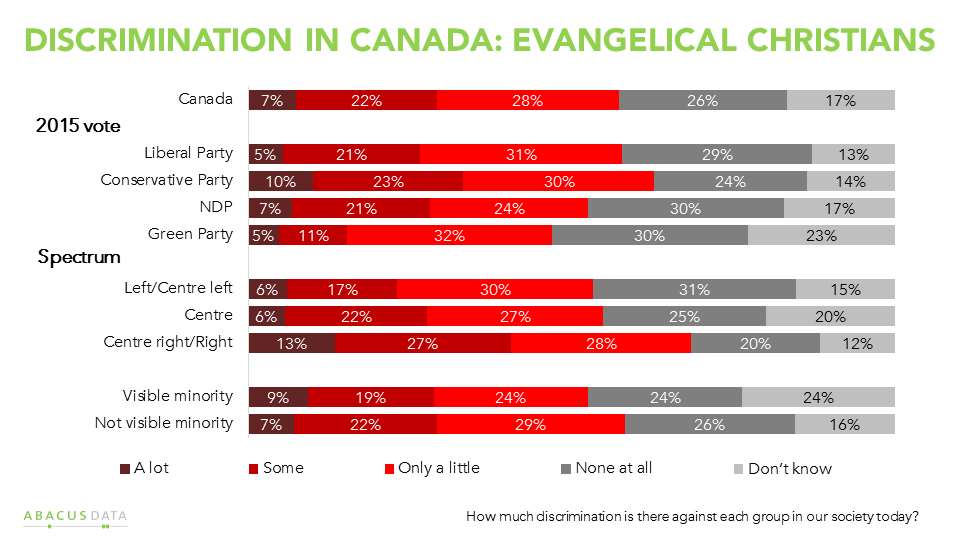Muslims and Indigenous People Face the Most Discrimination in Canada, According to Canadians
December 29, 2016
In our final survey of the year, we asked Canadians to tell us how much discrimination they see in our society, towards a variety of groups. To add context, we mimicked some questions that the Pew Research Center asked in the US recently. Here’s what we found:
• The large majority (79%) of Canadians say that there is “some” or “a lot” of discrimination towards Muslims in Canada, and two thirds (67%) say the same thing about discrimination towards Indigenous people.
• Almost one in two say there is a lot of discrimination against people of the Muslim faith, far more than towards any of the other groups we tested.
• Roughly equal sized majorities see (some or a lot of) discrimination towards black people and gays & lesbians.
• 1 in 2 (51%) say there is (some or a lot of) discrimination against women, and 45% say the same thing about people of the Jewish faith. 44% say people of Asian descent face discrimination.
• Fewer see discrimination against Evangelical Christians (29%) and white/Caucasian people (22%).
CANADA & US COMPARISONS
• Of 6 of 7 groups tested that compared directly to the results found in the US, Canadians were less likely to see discrimination in our society than Americans were in theirs. The only exception was discrimination against Jews, where results were about the same.
• The gaps between Canada and the US were particularly large in the case of perceived discrimination against gays and black people. Large proportions in both countries say there is “a lot” of discrimination against Muslims.
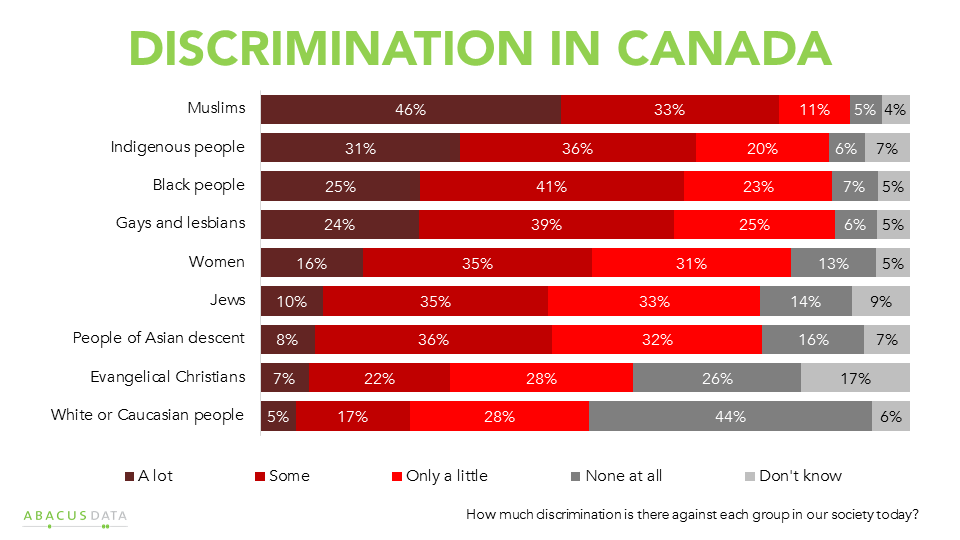
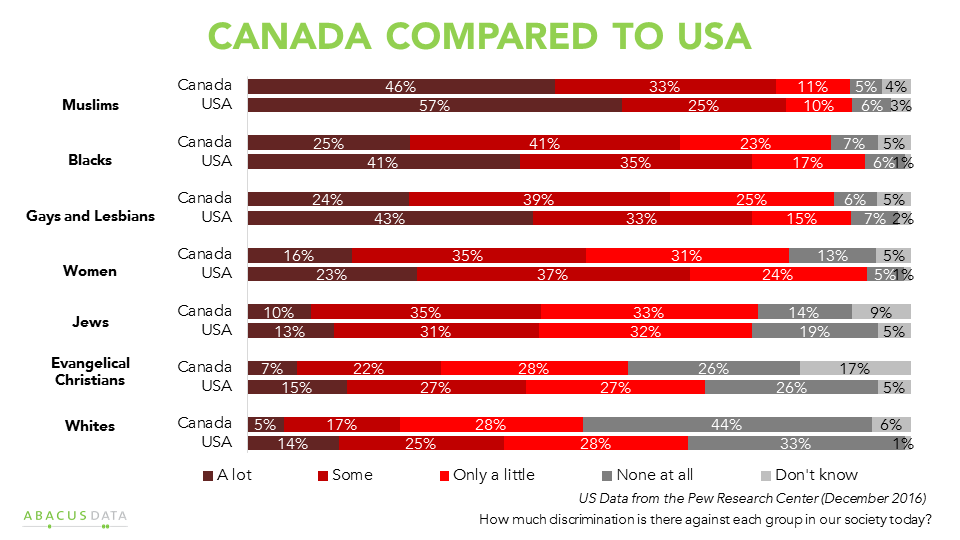
OBSERVATIONS WITHIN CANADA
• The view that there is significant discrimination against Muslims crosses all demographic groups and regions, although Quebecers are least likely to say it is widespread, compared to other regions.
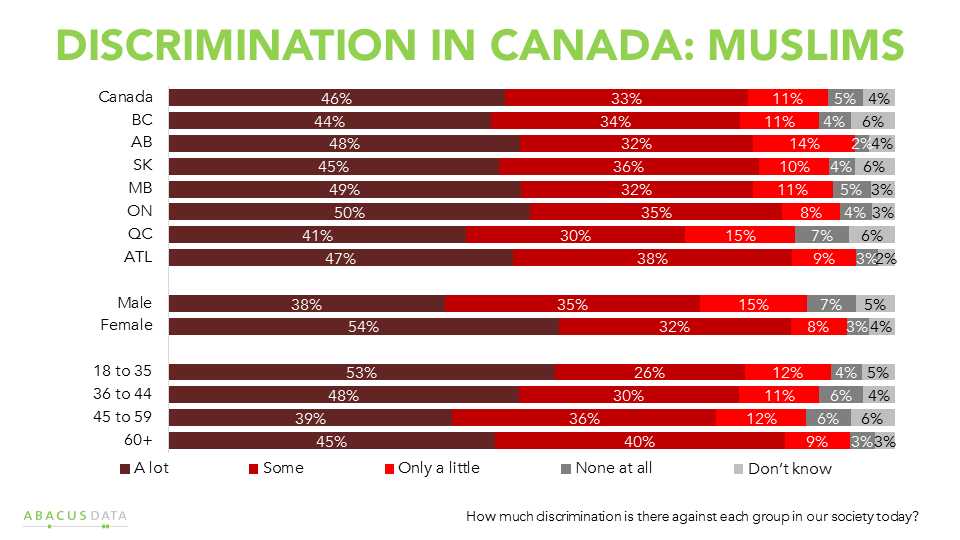
• In Canada, women and young people were generally more likely than others to see discrimination, while men and older people were least likely to see it. The gap by age is especially noticeable where discrimination against Asian people is concerned: younger people are much more likely to say it exists. Younger people are also a lot more convinced discrimination against women is widespread.
• BC residents are far more likely than others to see discrimination against people of Asian descent. People in Atlantic Canada were more likely than others to say there is some or a lot of discrimination against black people.
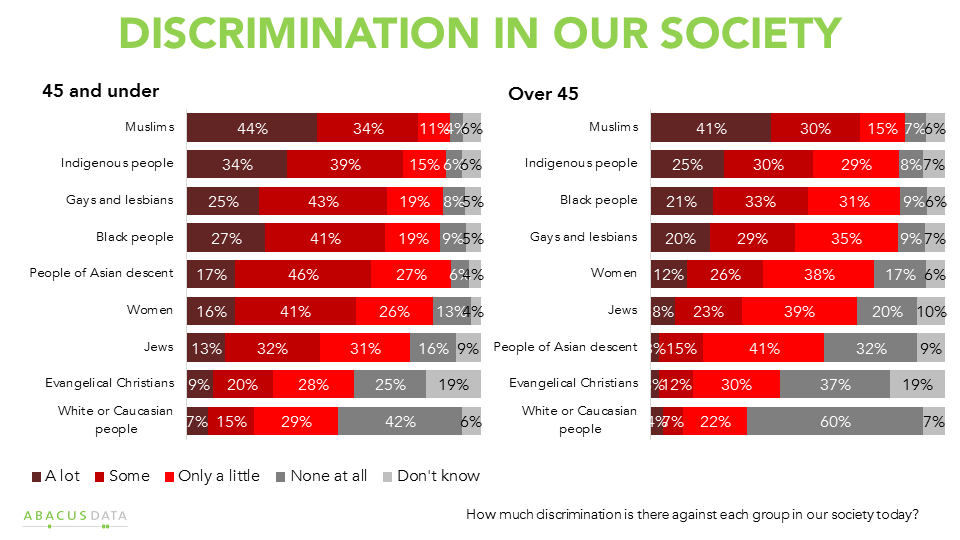
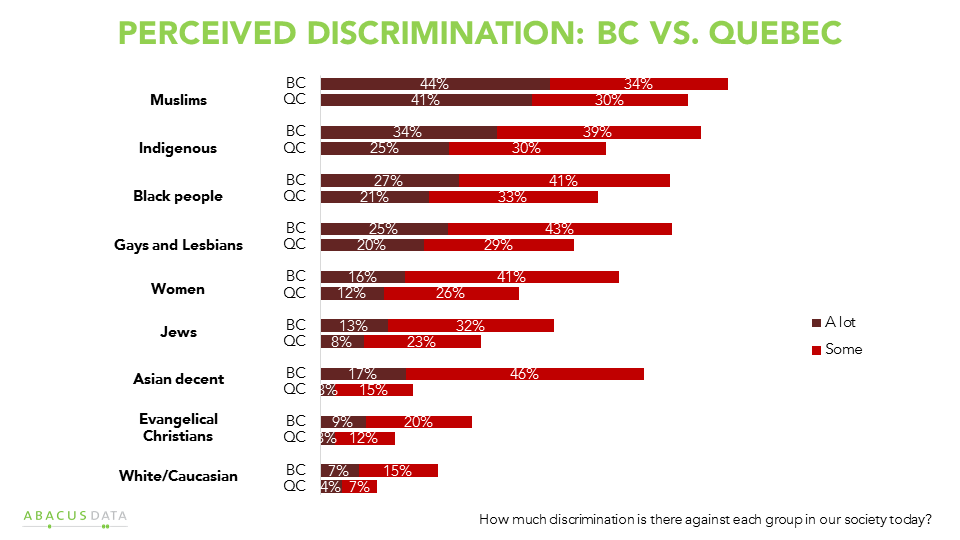
• Women were 20 points more likely than men to say there is some/a lot of discrimination against women.
• Liberals, New Democrats, Green Party voters were all about equally to say that women face discrimination – Conservatives were 15 points less likely to say so.
• Compared to other voting groups, Conservatives were more likely to observe discrimination against white people and Evangelical Christians, and see about an equal amount of discrimination against women, people of Asian descent, Jews, and Evangelical Christians.
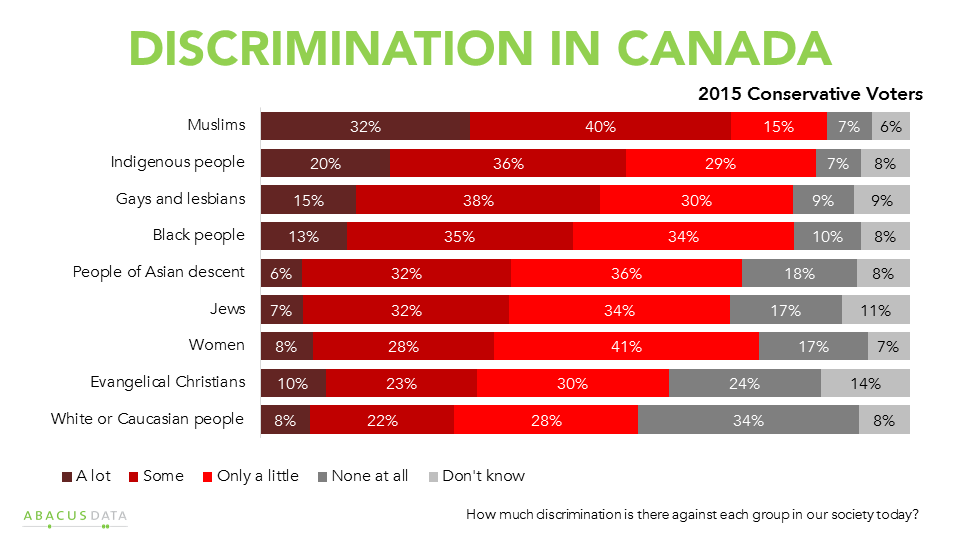
UPSHOT
According to Bruce Anderson:
“Canadians see their country as a tolerant place, but far from perfect. Tensions have been rising in the US and other parts of the world towards people of the Muslim faith and we acknowledge that those same influences are pretty widespread here in Canada.
There’s been progress in reducing discrimination based on sexual orientation, but we recognize this type of discrimination still exists.
Most Canadians show continuing dismay at the way Indigenous people are viewed and treated by others – which underpins a constant desire to do better and build bridges.”
According to David Coletto:
“Although we are less likely to perceive discrimination in our society than Americans, Canadians perceive that many groups face at least some discrimination. This is especially true of four groups: Muslims, Indigenous people, blacks, and gays and lesbians.
The generational and gender gaps in perceived discrimination are especially striking. In most cases, younger Canadians and women were more likely to say that groups faced a lot of discrimination in Canadian society.
While we are less likely to perceive discrimination in our society, than Americans feel about theirs, we are far from a world in which we don’t witness inequality and unfairness because of our race, sex, religion or sexual orientation. It may soon be 2017, but that doesn’t mean we live in a country without prejudice or discrimination.”
METHODOLOGY
Our survey was conducted online with 1,848 Canadians aged 18 and over from December 12 to 14, 2016. A random sample of panelists was invited to complete the survey from a large representative panel of over 500,000 Canadians.
The Marketing Research and Intelligence Association policy limits statements about margins of sampling error for most online surveys. The margin of error for a comparable probability-based random sample of 1,848 is +/- 2.3%, 19 times out of 20.
The data were weighted according to census data to ensure that the sample matched Canada’s population according to age, gender, educational attainment, and region. Totals may not add up to 100 due to rounding.
ABACUS DATA INC.
We offer global research capacity with a strong focus on customer service, attention to detail and value-added insight. Our team combines the experience of our Chairman Bruce Anderson, one of Canada’s leading research executives for two decades, with the energy, creativity and research expertise of CEO David Coletto, Ph.D.
DETAILED CHARTS
Below are charts reporting differences across regions, demographic groups, and political variables.
